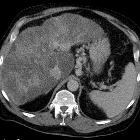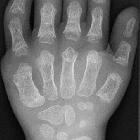asphyxiating thoracic dysplasia










Asphyxiating thoracic dysplasia, also known as Jeune syndrome, is a type of rare short limb skeletal dysplasia, which is primarily characterized by a constricted long narrow thoracic cavity, cystic renal dysplasia and characteristic skeletal features. It is also sometimes classified as one of the short rib polydactyly syndromes .
Epidemiology
Autosomal recessive inheritance with estimated incidence at around 1:70,000 births .
Pathology
Genetics
- thought to carry an autosomal recessive inheritance
Complications
- development of pulmonary hypoplasia
- renal failure from cystic renal disease
- development of hepatic cirrhosis
Radiologic features
There can be significant variation in the clinical spectrum. Features include:
Skeletal
- thoracic
- short narrow elongated chest shape (can be bell-shaped): may be seen as a narrow fetal thorax antenatally
- high riding clavicles ("handlebar clavicles")
- irregular costochondral junctions
- other skeletal
- dysplastic acetabula with flat acetabular roof
- trident acetabula
- short and flared iliac bones
- ischial and pubic bones with medial and lateral spurs
- premature closure of capital femoral epiphysis
- short broad phalanges
- short distal limbs (acromelic dwarfism)
- polydactyly (often post axial): 14%
- coned epiphyses
Abdominopelvic
- cystic renal disease
- cystic pancreatic disease
- hepatic dysfunction
Treatment and prognosis
The prognosis can be variable as a result of the marked phenotypic variation. In those who survive severe pulmonary symptoms in the first year of life, there can be an improvement in the skeletal and thoracic deformity with relative growth of the thoracic cage post birth. Most of the mortality is due to respiratory compromise.
History and etymology
It was first described by M Jeune in 1955 .
See also
Siehe auch:
- Leberzirrhose
- Polydaktylie
- Lungenhypoplasie
- Thanatophore Dysplasie
- Ellis-van-Creveld-Syndrom
- Hypophosphatasie
- short limb skeletal dysplasias
- Kurzripp-Polydaktylie-Syndrome
- narrow fetal thorax
- Metatrophe Dysplasie
- Auftreibung der Rippen
- Sensenbrenner-Syndrom
- Thorax-Kehlkopf-Becken-Dysplasie
- paternale uniparenterale Disomie des Chromosoms 14
und weiter:

 Assoziationen und Differentialdiagnosen zu asphyxierende Thoraxdysplasie (Jeune-Syndrom):
Assoziationen und Differentialdiagnosen zu asphyxierende Thoraxdysplasie (Jeune-Syndrom):







